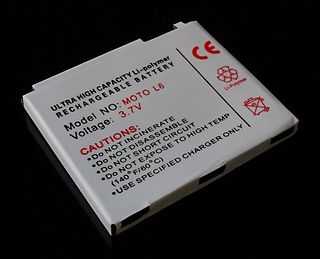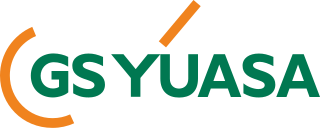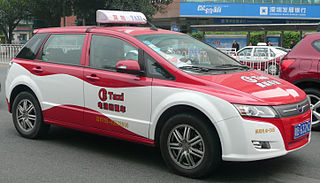
A lithium-ion battery or Li-ion battery is a type of rechargeable battery composed of cells in which lithium ions move from the negative electrode through an electrolyte to the positive electrode during discharge and back when charging. Li-ion cells use an intercalated lithium compound as the material at the positive electrode and typically graphite at the negative electrode. Li-ion batteries have a high energy density, no memory effect and low self-discharge. Cells can be manufactured to prioritize either energy or power density. They can however, be a safety hazard since they contain flammable electrolytes and, if damaged or incorrectly charged, can lead to explosions and fires.

A lithium polymer battery, or more correctly lithium-ion polymer battery, is a rechargeable battery of lithium-ion technology using a polymer electrolyte instead of a liquid electrolyte. High conductivity semisolid (gel) polymers form this electrolyte. These batteries provide higher specific energy than other lithium battery types and are used in applications where weight is a critical feature, such as mobile devices, radio-controlled aircraft and some electric vehicles.

SK Group is the second largest South Korean chaebol behind Samsung Group. SK Group is composed of 186 subsidiaries and affiliates that share the SK brand name and the group's management culture, named SKMS. It changed its name from Sunkyong Group to SK Group in 1998. The group is controlled by estate of Chey Tae-won through a holding company SK Inc. The cornerstone of SK Group is its energy and chemicals division.

GS Yuasa Corporation is a Kyoto-based Japanese company specializing in the development and production of lead acid and lithium-ion batteries, used in automobiles, motorcycles and other areas including aerospace and defense applications.
The lithium iron phosphate battery or LFP battery is a type of lithium-ion battery using lithium iron phosphate as the cathode material, and a graphitic carbon electrode with a metallic backing as the anode. The energy density of an LFP battery is lower than that of other common lithium ion battery types such as Nickel Manganese Cobalt (NMC) and Nickel Cobalt Aluminum (NCA), and also has a lower operating voltage; CATL's LFP batteries are currently at 125 watt hours (Wh) per kg, up to possibly 160 Wh/kg with improved packing technology, while BYD's LFP batteries are at 150 Wh/kg, compared to over 300 Wh/kg for the highest NMC batteries. Notably, the energy density of Panasonic’s “2170” NCA batteries used in 2020 in Tesla’s Model 3 is around 260 Wh/kg, which is 70% of its "pure chemicals" value.
LG Chem Ltd., often referred to as LG Chemical, is the largest Korean chemical company and is headquartered in Seoul, South Korea. It was the 10th largest chemical company in the world by sales in 2017. It was first established as the Lucky Chemical Industrial Corporation, which manufactured cosmetics. It is now solely a business-to-business company.

An electric vehicle battery is a rechargeable battery used to power the electric motors of a battery electric vehicle (BEV) or hybrid electric vehicle (HEV). Typically lithium-ion batteries, they are specifically designed for high electric charge capacity.

The thin film lithium-ion battery is a form of solid-state battery. Its development is motivated by the prospect of combining the advantages of solid-state batteries with the advantages of thin-film manufacturing processes.
A solid-state battery is a battery technology that uses solid electrodes and a solid electrolyte, instead of the liquid or polymer gel electrolytes found in lithium-ion or lithium polymer batteries.

A separator is a permeable membrane placed between a battery's anode and cathode. The main function of a separator is to keep the two electrodes apart to prevent electrical short circuits while also allowing the transport of ionic charge carriers that are needed to close the circuit during the passage of current in an electrochemical cell.
The sodium-ion battery (NIB or SIB) is a type of rechargeable battery analogous to the lithium-ion battery but using sodium ions (Na+) as the charge carriers. Its working principle and cell construction are almost identical with those of commercially widespread lithium-ion battery types, but sodium compounds are used instead of lithium compounds.

The electric vehicle industry in China is the largest in the world, accounting for around 57.4% of global production of electric vehicles (EVs) and around 500,000 exports in 2021. In 2021, CAAM reported China had sold 3.34 million passenger electric vehicles, consisting 2.73 million BEVs and 0.6 million PHEV, which is around 53% share of the global market of 6.23 million "new energy" passenger vehicles – BEVs, PHEVs, and HEVs. China also dominates the plug-in electric bus and light commercial vehicle market, reaching over 500,000 buses and 247,500 electric commercial vehicles in 2019, and recording new sales of 186,000 commercial EVs in 2021.
This is a list of commercially-available battery types summarizing some of their characteristics for ready comparison.

SK Innovation Co., Ltd. is an intermediate holding company of SK Group engaged in petroleum, alternative energy, and oil exploration. It runs its business through six major subsidiaries, including SK Energy, SK Geo Centric, SK Lubricants, SK Incheon Petrochem, SK Trading International, and SK IE Technology.
Contemporary Amperex Technology Co. Limited, abbreviated as CATL, is a Chinese battery manufacturer and technology company founded in 2011 that specializes in the manufacturing of lithium-ion batteries for electric vehicles and energy storage systems, as well as battery management systems (BMS). With a market share of 32.6% in 2021, CATL is the biggest lithium-ion battery manufacturer for EVs in the world, producing 96.7 GWh of the global 296.8 GWh, up 167.5% year on year. The company plans to have a manufacturing capacity target of >500 Gwh by 2025 and >800 Gwh by 2030.
Microvast Holdings, Inc. is a battery manufacturer founded in 2006 and headquartered in Stafford, Texas, that makes lithium-ion batteries for electric vehicles and energy storage systems. It operates manufacturing bases in the United States, China, and Germany.
China produced more than 15 billion units of lithium-ion batteries in 2019, which accounts for 73% of the world’s 316 gigawatt-hours capacity. China is a major producer of both lithium and electric vehicles, with favorable policies for manufacturers and consumers. Chinese made lithium-ion batteries were exported mainly to Hong Kong, the United States, Germany, Korea, and Vietnam. One of the major drivers of the demand for lithium-ion batteries comes from the electric vehicle industry since lithium-ion batteries have high energy density for their weight. In the decade since 2008, the production of lithium batteries has tripled.
Magnis Energy Technologies is an Australian energy storage company headquartered in New South Wales that specializes in the manufacturing of Lithium-ion battery. Founded in 2005, Mangis has subsidiary companies in New York, United States and Tanzania In 2017, Magnis signed a financial deal with Russian company Rosatom for its graphite project in Tanzania. In 2019, Magnis signed a business contract with Metallurgical Corporation of China for their graphite project. In 2021 Magnis’ subsidiary company Imperium3 New York received A$110m from Magnis for the production of battery cells. In 2021, Magnis Energy started production with Imperium3 in Endicott, New York. In 2022, Binghamton, New York based Magnis’ joint venture and technology partner CV4, a Lithium ion technology company released LiSER battery technology.
LG Energy Solution, Ltd. is a battery company headquartered in Seoul, South Korea. LGES is one of the largest battery maker alongside CATL, Panasonic, SK Innovation, and Samsung SDI.










